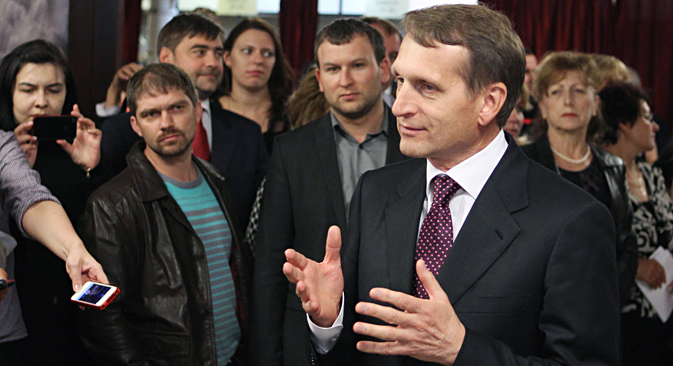
Sergei Naryshkin. Source: Sergei Kuksin / RG
RBTH: Parliamentary ties were one of the first casualties in the souring relations between Russia and the West. Inter-parliamentary relations, particularly with the U.S., the UK, the European Union, and possibly other countries, have been reduced to a minimum. What does the future hold for them?
Sergei Naryshkin: It is probably natural that we are hearing extremely radical assessments directed at Russia from individual deputies of foreign parliaments. After all, radical statements are always the loudest statements. However, there are many parliamentarians who have a completely realistic assessment of the situation surrounding Ukraine and of the reasons behind the crisis of confidence in Europe.
Since April 2014, the Russian delegation to the Parliamentary Assembly of the Council of Europe (PACE) has been unable to participate in the European body’s activities, after PACE passed a resolution over Russia’s role in the crisis in Ukraine. The resolution deprived Moscow’s delegation of the right to vote and excluded it from participation in ruling bodies and monitoring missions until 2015. Russia pays annual membership fees of about 23 million euros ($28.4 million) to the Council of Europe.
We have often heard European deputies sharply criticize their own governments and the European Union. I remember someone even said that the EU had taken Europe hostage.
But unfortunately, the Western press mostly reproduces only anti-Russian statements and phraseology. The Western press, assumed to be so free, is suddenly closing its eyes and ears. Take, for example, our meeting in Paris with the French parliamentarians and our other colleagues. There were almost no French journalists there. Were they not interested? Later we were told that they [the French legislators] had “done a little work” with the local media.
I was amazed. Russia is seemingly a young democracy – our constitution is going to be just 21 years old. But that kind of thing isn’t possible here. Our Foreign Ministry would be ashamed to do that kind of work with journalists.
RBTH: What can be done in the current situation?
S.N.: [We must] Not grow weary, set forth our position, tell the truth. Speak at international parliamentary platforms such as the OSCE Parliamentary Assembly and the PACE, no matter how ambivalent they feel about us.
RBTH: Will Russia make its payments to PACE?
We will pay because Russia’s fee generally goes towards the work of the entire Council of Europe structure. The Council of Europe includes the Committee of Ministers, the Parliamentary Assembly, and the so-called Venice Commission. But if PACE doesn’t restore the Russian parliamentary delegation’s powers – and I mean in full – we’ll think about how to go on with Russia’s contribution.
RBTH: What about your relations with American parliamentarians?
S.N.: We never had any far-reaching cooperation with our colleagues from the U.S. Although, by the way, we did propose a meeting at the beginning of the period when things started getting worse. Our American partners said they didn’t want to. It is common knowledge that those who sense the weakness of their position avoid dialogue.
RBTH: Can you comment on inter-parliamentary ties between Russia and Ukraine? What do you expect from the new Rada?
S.N.: Right now all contact with the Rada is frozen. And that’s not our fault, either. Take our proposal to create an international parliamentary group on Ukraine on the OSCE Parliamentary Assembly platform. We were supposed to have its first meeting in Geneva.
A few days before the appointed date, the Americans said they weren’t coming. The Polish said the same. At the last minute, the Ukrainians themselves backed out. Obviously, the three had a common plan to block the work of the group. But we still expect it to work.
All rights reserved by Rossiyskaya Gazeta.
Subscribe
to our newsletter!
Get the week's best stories straight to your inbox